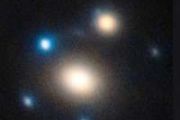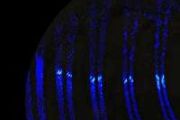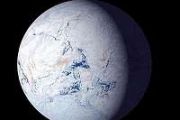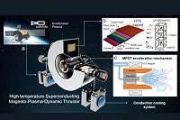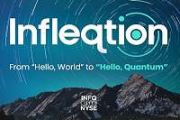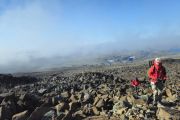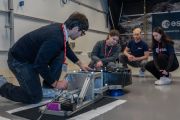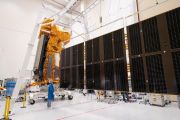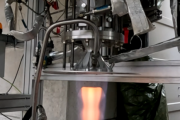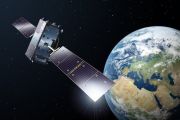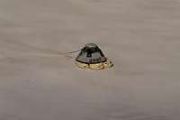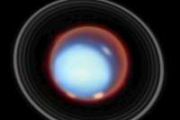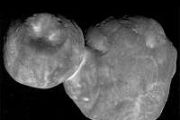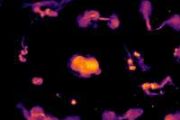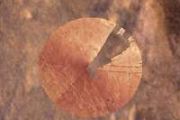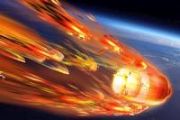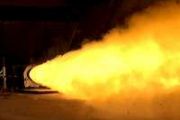
Copernical Team
The bacteria that wont wake up found in spacecraft cleanrooms
 Researchers have characterized a bacterium from spacecraft assembly cleanrooms that can enter an extreme dormant state, allowing it to persist where contamination controls are designed to remove nearly all life. The study centers on Tersicoccus phoenicis, a microbe detected in high-grade cleanrooms used by NASA and the European Space Agency to prepare spacecraft hardware.
The team found th
Researchers have characterized a bacterium from spacecraft assembly cleanrooms that can enter an extreme dormant state, allowing it to persist where contamination controls are designed to remove nearly all life. The study centers on Tersicoccus phoenicis, a microbe detected in high-grade cleanrooms used by NASA and the European Space Agency to prepare spacecraft hardware.
The team found th Galileo pre-launch media briefing
 Video:
00:42:04
Video:
00:42:04
Watch the replay of the media briefing held ahead of the 14th operational launch of the Galileo programme. The briefing covers the mission details for the launch of two Galileo satellites, which are set to lift off on 17 December aboard Ariane 6 from Europe’s Spaceport in French Guiana.
Flaring black hole whips up ultra-fast winds

Leading X-ray space telescopes XMM-Newton and XRISM have spotted an extraordinary blast from a supermassive black hole. In a matter of hours, the gravitational monster whipped up powerful winds, flinging material out into space at eye-watering speeds of 60 000 km per second.
RISTRETTO spectrograph cleared for Proxima b atmospheric hunt
 The RISTRETTO project at the University of Geneva has reached a key stage, with several core elements of its high-precision spectrograph now prototyped and tested for observations of the nearby exoplanet Proxima b. The instrument is designed to study the faint reflected light of this Earth-sized planet, which orbits Proxima Centauri at a temperature compatible with liquid water but remains outsh
The RISTRETTO project at the University of Geneva has reached a key stage, with several core elements of its high-precision spectrograph now prototyped and tested for observations of the nearby exoplanet Proxima b. The instrument is designed to study the faint reflected light of this Earth-sized planet, which orbits Proxima Centauri at a temperature compatible with liquid water but remains outsh AI advances robot navigation on the International Space Station
 Imagine a robot about the size of a toaster floating through the tight corridors of the International Space Station, quietly moving supplies or checking for leaks - all without an astronaut at the controls. Such technology could free up valuable time for astronauts and open new opportunities for robotics-based exploration. That sci-fi vision is coming closer to reality now that Stanford research
Imagine a robot about the size of a toaster floating through the tight corridors of the International Space Station, quietly moving supplies or checking for leaks - all without an astronaut at the controls. Such technology could free up valuable time for astronauts and open new opportunities for robotics-based exploration. That sci-fi vision is coming closer to reality now that Stanford research New island of inversion found in proton neutron symmetric molybdenum nuclei
 For decades, nuclear physicists have known that so called islands of inversion mark regions of the nuclear chart where standard shell structure breaks down and magic numbers vanish in favor of strongly deformed shapes. In earlier work these islands were identified mainly in neutron rich isotopes such as beryllium 12 with N = 8, magnesium 32 with N = 20, and chromium 64 with N = 40, all distant f
For decades, nuclear physicists have known that so called islands of inversion mark regions of the nuclear chart where standard shell structure breaks down and magic numbers vanish in favor of strongly deformed shapes. In earlier work these islands were identified mainly in neutron rich isotopes such as beryllium 12 with N = 8, magnesium 32 with N = 20, and chromium 64 with N = 40, all distant f Nova images capture complex stellar blast behavior
 An international group of astronomers led by Texas Tech University assistant professor Elias Aydi published a paper titled Multiple outflows and delayed ejections revealed by early imaging of novae in Nature Astronomy on Dec. 5. The team used interferometry with the Center for High Angular Resolution Astronomy (CHARA) Array in California, combining light from multiple telescopes to obtain the hi
An international group of astronomers led by Texas Tech University assistant professor Elias Aydi published a paper titled Multiple outflows and delayed ejections revealed by early imaging of novae in Nature Astronomy on Dec. 5. The team used interferometry with the Center for High Angular Resolution Astronomy (CHARA) Array in California, combining light from multiple telescopes to obtain the hi Gravitational lens time delays refine Hubble constant
 Astronomers are testing a new way to measure how fast the universe is expanding by using time delays in gravitationally lensed images of distant quasars, in an effort to clarify the long-standing tension between different measurements of the Hubble constant.
The expansion rate of the universe, known as the Hubble constant, describes how quickly galaxies recede as a function of distance, wi
Astronomers are testing a new way to measure how fast the universe is expanding by using time delays in gravitationally lensed images of distant quasars, in an effort to clarify the long-standing tension between different measurements of the Hubble constant.
The expansion rate of the universe, known as the Hubble constant, describes how quickly galaxies recede as a function of distance, wi Record gamma ray burst traced to dusty massive host galaxy
 Gamma ray bursts rank among the most energetic explosions known, usually flashing and fading within seconds or minutes, but on 2 July 2025 astronomers detected GRB 250702B, a source that produced repeated bursts for over seven hours and now stands as the longest gamma ray burst yet observed. Space based observatories, including NASAs Fermi Gamma ray Space Telescope, first recorded the gamma rays
Gamma ray bursts rank among the most energetic explosions known, usually flashing and fading within seconds or minutes, but on 2 July 2025 astronomers detected GRB 250702B, a source that produced repeated bursts for over seven hours and now stands as the longest gamma ray burst yet observed. Space based observatories, including NASAs Fermi Gamma ray Space Telescope, first recorded the gamma rays Neutron Hungry Hippo fairing completes qualification ahead of first launch
 Rocket Lab Corporation has qualified the captive Hungry Hippo fairing for its Neutron launch vehicle and is sending the structure to Virginia for integration ahead of the rocket's debut mission. The fairing halves remain attached to Neutron's first stage from liftoff through landing, rather than separating and being discarded or recovered at sea. In flight, the halves open to release the second
Rocket Lab Corporation has qualified the captive Hungry Hippo fairing for its Neutron launch vehicle and is sending the structure to Virginia for integration ahead of the rocket's debut mission. The fairing halves remain attached to Neutron's first stage from liftoff through landing, rather than separating and being discarded or recovered at sea. In flight, the halves open to release the second 







